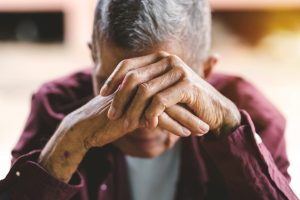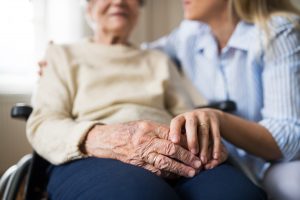Placing a loved one in a nursing home is a very difficult decision. Their health, safety, and daily care is put into the hands of strangers—strangers who may not always be trustworthy, and can sometimes even be abusive. A person who is disabled or ill makes an easy target for mistreatment. Because it’s not always possible for them to communicate verbally, it’s important to be aware of the signs of nursing home abuse or neglect and how to act accordingly.
Abuse and Neglect of the Elderly Is a Serious Issue
According to the CDC, there are over 1.4 million people living in nursing homes across the US. According to the National Center on Elder Abuse, reports of elder abuse continue to rise, and it is estimated that for every case reported there are 24 that are not.
The most frequently reported forms of abuse are verbal, financial, and physical, but there are also many cases of sexual and emotional abuse, as well as neglect. It is truly heartbreaking to realize how helpless elderly residents of long-term care facilities are, especially when we consider that many elderly people do not have a family or social support network to look out for their best interests.
Defining What Is Abuse and Neglect
Before we go any further in discussing abuse and neglect, it is important to clearly define these terms. The definition used for abuse in the context of nursing homes is “unreasonable confinement, the intentional infliction of injury, or care deprivation that results in pain, harm, or mental anguish.” Neglect is different from abuse, although its impact is every bit as severe. Neglect involves a failure to provide the services and care needed to keep a resident from pain or harm, as well as a failure to react to situations that are potentially dangerous that result in harm or anxiety.
Abuse and neglect can take many forms. The more physical forms include violent acts such as kicking, shaking, slapping, pinching, shoving, and pushing. There is also the use of unreasonable physical restraint, such as restraining someone to a chair or secluding or isolating them for long periods of time as punishment.
While physicians often authorize some forms of physical and/or chemical restraint, there are limitations and guidelines for their use; to go beyond that falls into the area of abuse. Sadly, rape and other forms of sexual assault are also far too common in nursing homes.
Other forms of neglect include:
- Deprivation of food or water without physician authorization
- Failure to keep residents clean
- Allowing bedsores to develop
- Leaving wounds untreated
- Allowing residents to sit or lie in their own waste.
Tell Tale Signs of Abuse and Neglect
Fortunately, there are common signs that indicate someone in a long-term care facility is being abused or neglected. Look for physical signs such as these:
- Falls, repeated head injuries, or fractures
- Unexplained (or poorly explained) cuts, bruises, skin tears, and/or welts
- Bed sores (or pressure ulcers), especially on the buttocks, hips, and heels
- Unclean or unsanitary conditions, including strong urine or feces odor
- Signs of dehydration or malnutrition
- Rapid, unusual changes in weight or signs of malnutrition
- Unexpected or unexplained death
- Heavy sedation or medication
- Death or injury occurring not long after an episode of wandering
- Frequent illnesses or injuries that are not reported to the family in a timely manner
There are emotional signs of abuse, also:
- A desire to be isolated away from others
- Inexplicable changes in behavior, reluctance to be touched, rocking, or biting
- Reluctance to speak when staff members are present
- Extreme anxiety or agitation
- Being withdrawn and refusing to communicate
It is important to keep in mind that these signs do not necessarily mean there is neglect or abuse. This is further complicated when dealing with an individual who suffers from dementia, which causes many of the same emotional symptoms. A pattern of both physical and emotional signs, however, is a red flag and demands further investigation.
When Someone Is Abused or Neglected
If you suspect that a loved one or friend is being abused, you should begin by making sure they are not in immediate danger. Often, having someone check on them or visit regularly can help protect them temporarily if there are dangers. Next, talk to them to see if they will comment on what is going on, realizing that they may be reluctant to report mistreatment. Document everything you can, including photographs, medical reports, and accident reports.
It is also a good idea to keep a journal documenting any incidents and your impression of them. You should then speak with the nursing home administrators, who will have a procedure in place for you to file a grievance. Find out more about your loved one’s rights, which will likely involve consultation with a lawyer. A nursing home abuse lawyer will assist you with the next steps, such as filing an official complaint.
Your Nursing Home Abuse Lawyer
If you, a family member, friend, or loved one has suffered injury or harm because of abuse or neglect at a nursing home or other long-term care facility, the lawyers at Sacchetta & Baldino can help you. We have obtained many nursing home abuse verdicts and negotiated settlements on behalf of our clients on a contingent fee basis. We will aggressively fight for the rights of those who need us. Contact us today for a free consultation.



